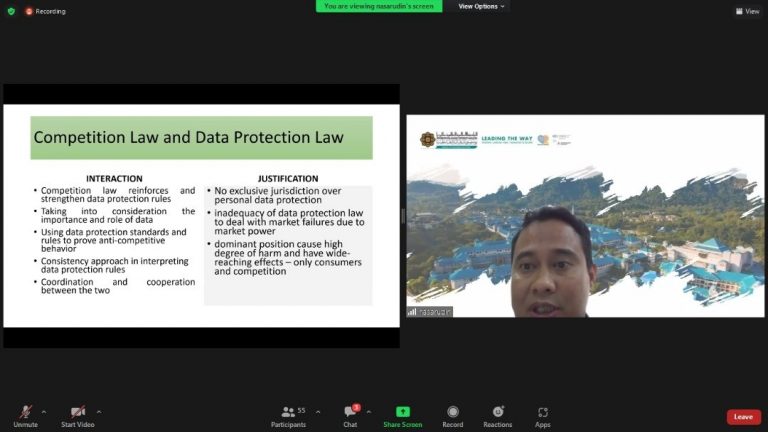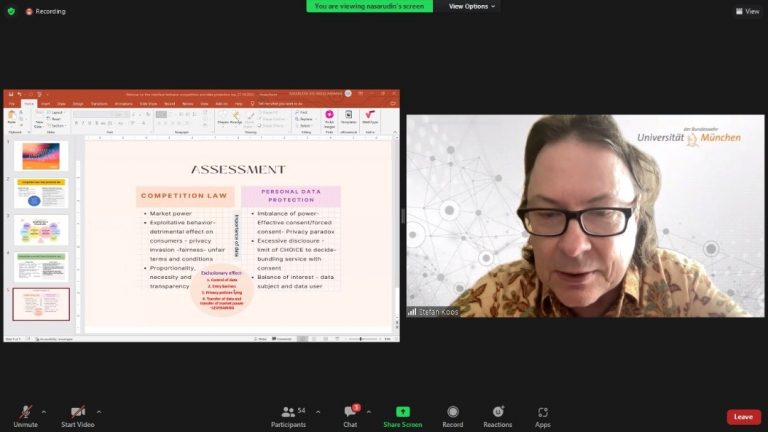
Gombak, 21 October 2022. Studies on the interface between competition law and data protection law cannot be more emphasised in this digital economy. Both laws play unique and important roles in ensuring our economy grows while protecting consumers.
This is the commonality of the two legal regimes that was highlighted by the speakers in the Webinar under the title “the Interface between Competition and Data Protection Laws” held on Friday, 21 October 2022.

Speakers in the webinar are Prof. Dr Stefan Koos from Munich Bundeswehr University and Assoc. Prof. Dr. Nasarudin Abdul Rahman from Ahmad Ibrahim Kulliyyah of Laws (AIKOL) IIUM, who is also a member of Malaysian Competition Commission (MyCC). The moderator of the session is Assoc. Prof. Dr. Sonny Zulhuda from the Media and Communications Law Research Unit AIKOL, IIUM.
Prof Stefan who is an Adjunct Professor at Universitas Airlangga, Indonesia, discusses the foundational issues surrounding data asset and data usage in today’s digital economy.
Setting the Internet of things as a background, Stefan highlights how the digital market today has created its own particularities unknown in the market of the past. For example, the emergence of multi-sided market creates new multirole entities such as Amazon who is both seller and service provider.
In fact, in the case of shared economy like e-hailing services, we witness intermediaries who determine the market and sometimes take control of both consumers and sellers.
Prof Stefan also points out that data had even been used as “payment” for digital products such as mobile apps. However, this triggers more problem as to how to value a data as payment or as economic asset.
At the same time, continued Stefan, data protection sets limit to the commercial use of data by the platform. This has obviously created a tension between the need to use data on one hand (by industry), and the concern to protect it on the other (from consumer’s point of view).
Quoting provisions from the Europe’s Data Act proposal (2022) as part of the complexities, Stefan believe that there is a way out to consolidate the situation. He argues that in order for the consumer to exploit his self-generated personal data economically, the law should grant him such power.
There are some ways how law can do this – with a variation of readiness and practicability. First, by way of contract, as in a contract between consumer and the service provider. Secondly, via the consumer rights to personal data protection such as right to withdraw consent and right to delete data. Thirdly, Stefan argues, one may consider applying the sui generis intellectual property right of the consumer, namely the principle of moral rights vis a vis economic right of the author. This is in practice borrowing the principle of personality right.

The presentation of the second speaker Assoc. Prof. Dr. Nasarudin came with the background of Facebook case recently decided in German court.
Nasarudin points out that in the era of digitalization, data becomes an important aspect of business competitiveness. Data is used to improve product and services and to fund online platform which provides services to end users for free (such as social networking). However, he reminds that while data collection and data processing ignite competition in the market by providing improved products and wider choices, it has spillover effect on data privacy due to extensive data processing without explicit consent from data subject.
Based on his studies, Nasarudin cites an example that data is now concentrated in the hand of big tech companies such as Google, Amazon, Facebook and Apple (GAFA). They can collect and process large amount of data from various sources at speed. Due to data concentration, the big tech companies have competitive advantage against smaller companies. According to him from time to time, these companies can control access to data which is important for other companies such as advertisers, publishers, and content providers to operate their business.
Further, Nasarudin states that since big tech companies control the data and access to the data, they can engage in anti-competitive behavior and abuse of dominant/monopoly position such as imposing unfair terms on end users to collect more data without separate and explicit consent from data subject, refusal other businesses who are dependence on the platform to get access to the data etc.
While data protection regulates data processing, it does not address privacy issues relating to market failures such as abuse of dominant position or concern with market competition and the importance of data. Therefore, Nasarudin is of the view that competition law can be used to address the issues relating to breach of data privacy provided that it must be in line with the goal that competition law seeks to achieve.
The webinar that lasted for two hours were ended with Q&A sessions. The participants actively engaged with the speakers on variety of issues.
The moderator summarises the session nicely when he said that understanding this interface is yet another challenge for legal fraternities as there are a lot to come from this digital environment.
The fact that there are many questions arise is just as encouraging. It is hoped that AIKOL through its research units such as the South East Asia+ and the Media and Communications Law Research Units can pursue and facilitate more discourse in the future.
(Prepared by: Dr Sonny Zulhuda and Dr. Nasarudin Abdul Rahman)
